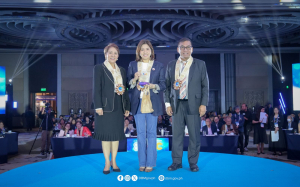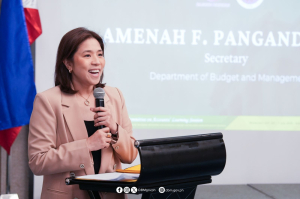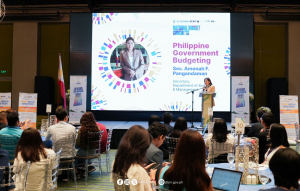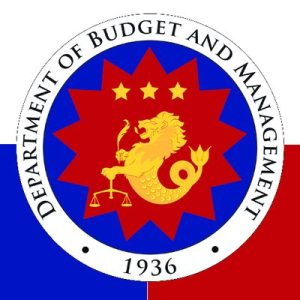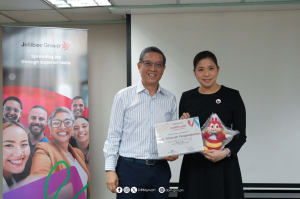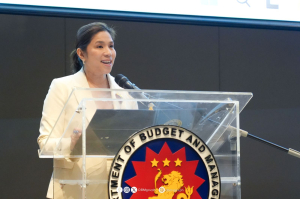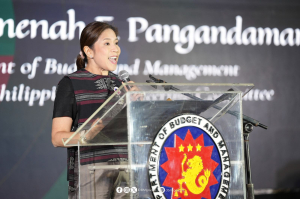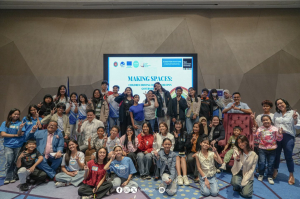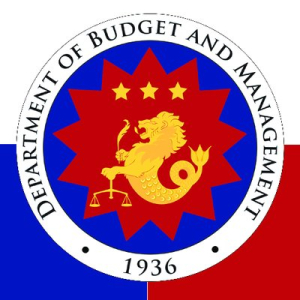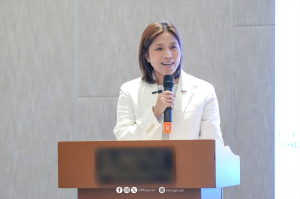
- Details

To the Department of Science and Technology (DOST), headed by Secretary Dr. Renato U. Solidum Jr.;
Former DOST Secretaries: Dr. Fortunato T. de la Peña and Dr. Emil Q. Javier;
Commission on Audit Assistant Commissioner Alexander B. Juliano;
TECO-Vietnam Science and Technology Division Director Wen-Ling Deng;
Members of the Diplomatic Corps, distinguished leaders from the government and civil society, members of the academe, ladies and gentlemen:
Good morning!
Assalamu alaikum wa Raḥmatullahi wa Barakatuh.
What an honor it is to be in a room filled with brilliant minds behind the advancement of our country’s research and development (R&D) landscape!
My heartfelt gratitude goes to the DOST for inviting me to speak at the 8th National R&D Conference (NRDC)—a vital platform for stakeholders to collaborate and ensure that research translates into meaningful societal impact.
R&D is close to my heart because I started out as a researcher! Fresh out of college, I did research for then-Professor, now Department of Economy, Planning, and Development (DEPDev) Secretary Arsi Balisacan. So, I am also a proud member, or at least alumna, of the R&D community!
Your theme, “R&D Building Better Lives: Leveraging Transdisciplinary R&D for Well-Being, Wealth Creation, Wealth Protection, and Sustainability,” aligns with the Administration’s strategy of R&D as a key driver of the economy, enabling us to overcome structural challenges, boost productivity, and improve the quality of life of every Filipino.
In fact, at the core of our socioeconomic transformation agenda is the creation of a dynamic innovation ecosystem. The Philippine Development Plan (PDP) 2023 to 2028 outlines key strategies to strengthen basic R&D, foster market-driven and customer-centered innovations, scale up technology use, and accelerate innovation and entrepreneurship. And in the past few years of implementing these strategies, we have witnessed positive outcomes within our communities and even in global assessments.
In 2024, the Philippines improved its standing in the Global Innovation Index (GII), ranking 53rd out of 133 economies. This means that we have climbed three spots, consistently upholding our country’s “innovation overperformer”1 status for the sixth time! And I am proud to note that we are now among the top three performers in terms of innovation among the lower-middle-income countries, succeeding India and Vietnam.
With these recent developments, we aim to continue rising in the GII and even cement our position as one of the most innovative countries, hopefully soon in the upper-middle-income status category. And I believe that we can all do it!
But first, we must build strategic partnerships with civil society, the academe, business groups, and the private sector to ensure that our initiatives are cohesive and not fragmented. I would like to commend the DOST for actively engaging a diverse range of stakeholders in the preparation and development of the Harmonized National R&D Agenda 2022 to 2028—our roadmap for ensuring that our science, technology, and innovation endeavors lead to maximum economic and social benefit for our people.
Our Public-Private Partnership (PPP) Code also recognizes the establishment of research facilities as eligible projects under the PPP. These facilities will not only provide the infrastructure needed to conduct cutting-edge research but also serve as innovation hubs where ideas can thrive and contribute to sustainable growth.
Second, let us further leverage digitalization. On our end at the Department of Budget and Management (DBM), we are using modern technologies such as geo-tagging software for our Project DIME, or the Digital Information for Monitoring and Evaluation, which will track the progress of government programs and projects. This is not just an efficiency measure but also an anti-corruption measure, promoting transparency.
Third, we must invest in our people through scholarships, capacity-building, and structural support, aligned with our commitment to sustaining our progress in the GII’s 'Human Capital and Research' indicator, where we rose to 84th place in 2024 from 88th in 2023.
Of course, our National Budget supports R&D and innovation to nurture future-ready generations.
For Fiscal Year 20253, we allocated some Php 7.49 billion for the DOST Science Education Institute (SEI), covering the Science and Technology (S&T) Scholarship Program (Php 7.33 billion) and S&T Education Development Program (Php 88.25 million), while programs under the Philippine Science High School System have a total budget of Php 2.71 billion.
We have also allocated Php 3.54 billion for the DOST R&D Institutes, for research in fields such as nuclear energy, food and nutrition, and industrial technology, among others. Through these, we hope to have more Science, Technology, Engineering, and Mathematics (STEM) graduates and researchers empowered to lead our country’s journey toward becoming a global leader in R&D.
Another key indicator of the Global Innovation Index is the Gross Expenditure on R&D—an area where we made steady progress, rising to 71st place in 2024 from 73rd in 2023. I am confident that we can maintain this momentum, as supporting R&D and innovation has always been embedded in our Budget Priorities Framework since the beginning of President Ferdinand R. Marcos Jr.’s Administration.
We are also actively working with academic institutions and the private sector to support the conduct of studies aimed at enhancing public service delivery.
Just last May, we engaged with the Ateneo School of Government and Unilab Foundation, and the DBM committed to assisting them in expanding their data gathering for research on local government health financing. Through this R&D collaboration, we are strengthening the government’s fiscal performance, which results in better public service because it is data-driven.
We also have an R&D consortium which was established in 2023 through the Mindanao, Sulu, Palawan Innovative Research and Development Consortium, or the MinSuPala-IRDC. This consortium unites 14 State Universities and Colleges (SUCs) from Regions IX and XII, and the Bangsamoro Autonomous Region in Muslim Mindanao (BARMM), working together to promote regional development through research, collaboration, and innovation.
The MinSuPala-IRDC supports the UN Sustainable Development Goals No. 2—Zero Hunger—by focusing on SDG-aligned research policy briefs and open data portals for evidence-based planning.
Building on this success, we have now expanded our efforts by establishing the “Mainstreaming Innovation for Agri-Fishery Research and Development Consortium - Zamboanga Peninsula (MInA RDC-ZamPen)” through the Memorandum of Agreement that we signed with the SUCs in Region IX just this July.
The new consortium is designed to strengthen the agri-fishery industry, drive investments in R&D infrastructure, and ensure that innovation reaches the fields, the farms, and the fisheries where it is most needed.
We also have one consortium in the Cordilleras to support the development of our country’s bamboo industry.
In addition, we continue to host study visits to provide an opportunity for our college students to learn how we promote the sound, efficient, and effective management of our government resources, right within the halls where key decisions in public financial management are made. As we transform our spaces into avenues for learning, we cultivate a new generation of inspired and well-informed public servants.
Finally, as Chair of the Philippine Open Government Partnership (PH-OGP), we are upholding open data principles to enable citizens’ meaningful participation in governance. We are intensifying efforts to advance the legislation of the Right to Information (RTI) Law, which will also empower researchers by giving them access to vital government data, laying the groundwork for evidence-based decision-making, program implementation, and policy development.
So today, as we stand at a critical juncture—just a few days before the 20th Congress convenes for its first session—I urge all of you to join us in amplifying the call for the passage of the Right to Information Law.
Through these initiatives, the PBBM Administration demonstrates its full commitment to upholding a research and development landscape that will truly help us fulfill the potential of our nation.
I believe that together, we can unlock the full potential of our R&D sector to build a Bagong Pilipinas where research fuels progress, strengthens public trust, and drives people-centered governance.
Thank you very much! Mabuhay ang Bagong Pilipinas!
END
References:
[1] https://www.wipo.int/web-publications/global-innovation-index-2024/en/
[2] https://www.bain.com/insights/better-faster-cheaper-how-digital-transforms-r-and-d/
[3] https://www.dbm.gov.ph/wp-content/uploads/GAA/GAA2025/VolumeIB/DOST/DOST.pdf

- Details

To the Asian Institute of Management (AIM), headed by Dr. Jikyeong Kang;
The Bangsamoro Parliament members and Committee on Accounts Chairperson Khalid M. Hadji Abdullah;
And to all the participants of this program, members of the academe, ladies and gentlemen:
Good morning!
Assalamu alaikum wa Raḥmatullahi wa Barakatuh.
First, I would like to express my heartfelt gratitude to AIM’s School of Executive Education and Lifelong Learning (SEELL) for developing this capacity-building program on financial governance and budget formulation. This event attests to your commitment not only to empowering our public servants in the Bangsamoro Autonomous Region in Muslim Mindanao (BARMM) but also to driving our nation’s inclusive development.
This is especially meaningful to me as a daughter of Mindanao, whose dream is to see a BARMM that is thriving and a Mindanao that shines as a land of promise.
That is why I have been working very hard not only as Budget Secretary but also as Co-Chair of the Intergovernmental Relations Body or IGRB which was created to strengthen the BARMM’s institutions and support its complete transition to autonomy.
I am proud to report that we are now reaping the positive outcomes of our sustained coordination and strong collaboration.
Some of our most recent developments are detailed in the third IGRB progress report, which we presented and turned over to President Ferdinand R. Marcos Jr. last July 2024, just in time for the sixth anniversary of the signing of the Bangsamoro Organic Law.
To name a few, we have activated and operationalized all seven IGR mechanisms, which will provide platforms for strengthened partnership between BARMM and the national government and shall serve as the basis for all laws and policies enacted by the Bangsamoro Transition Authority (BTA) Parliament.
One of these mechanisms is the Intergovernmental Fiscal Policy Board, which has approved the guidelines on Official Development Assistance (ODA) loans for BARMM, authorizing the region to contract loans, in cash or in kind, from foreign governments and multilateral institutions or organizations. We view this milestone as a vital step towards making BARMM an investment destination like the rest of the Philippines.
In December, we completed the IGRB Manual of Operations, just four months after PBBM’s instruction to expedite its finalization. This document further guides the region’s socioeconomic transformation and the continued implementation of the Bangsamoro Organic Law during the transition period and beyond.
Alhamdulillah for these accomplishments—a testament to our enduring commitment to peace and development, which inspires us to work even harder for our people!
In line with this, I commend the Bangsamoro Parliament members present here today for participating in this three-day program, demonstrating your dedication to enacting a resilient and inclusive budget for BARMM.
As Budget and Management Secretary, it is my honor to share with you the guiding principles behind the reforms that we have been implementing to uphold a National Budget that truly fulfils the needs and aspirations of the Filipino people.
First, at the DBM, we ensure that every peso is spent for its intended purpose and for the benefit of the people. Even if there are people who are constantly trying to cast doubt on the government, I assure you that at the DBM, we are simply focused on our work and our mission to serve the people. I am very proud of our dedicated DBM officials and staff—we have here Undersecretary Margaux Salcedo whom you also know—they are the true public servants.
As a concrete example, when I started as Budget Secretary, I was met with calls by Congress to abolish the Procurement Service of the DBM, which they were blaming for corruption in government. My response to that was to say no to abolition because we need a good procurement system. Instead, I initiated a procurement reform.
Since public procurement accounts for an average of 13 to 20 percent of every country’s GDP, procurement is necessary although it has also been prone to corruption.
So the DBM, with our Procurement Service and our Government Procurement Policy Board, initiated the crafting of amendments to the decades-old Government Procurement Reform Act.
I am happy to share that in less than two years, because of our hardworking teams and through our close collaboration with Congress, this was signed into law in July of last year—a DBM legacy under this Administration.
This has been hailed as the largest anti-corruption measure in the country’s recent history. Among its many anti-corruption mechanisms, it prevents conflicts of interest through the mandatory declaration of Beneficial Ownership Information, increases efficiency through an accessible eMarketplace or a digital app similar to Lazada and Shopee where you can just add to cart, and streamlines processes using Standard Procurement Forms, all of which enhance public service delivery.
Before, we all go through competitive bidding. But now, we introduced a lot of new mechanisms to make procurement work better. So maybe, through the SEELL of AIM, you can also offer a Procurement course, together with the PFM courses that we offer in DBM.
Second, at the DBM, we ensure that the way we manage our public funds is attuned to the changing times.
With this in mind, we developed the Public Financial Management (PFM) Reforms Roadmap 2024-2028—the country’s blueprint for modernizing and harmonizing our PFM processes. In line with Executive Order No. 29, s. 2023, this roadmap will expedite the adoption of the Integrated Financial Management Information System (IFMIS), digitalizing all government agencies.
A crucial part of this is the Budget and Treasury Management System or what we call BTMS, which was launched last December 2024. It connects existing separate systems into a central, real-time monitoring hub for government transactions.
What happens now is that agencies submit their quarterly report manually, and sometimes, they don’t meet the deadline. It is difficult for us to do policy work if we don’t have the data. So with this, once all the agencies are connected, all of us, not just the DBM, can look at the website and see the balances, transactions, saan napunta ang pera, at sino ang gumamit ng pera ng ating gobyerno.
We also revived Project DIME, or the Digital Information for Monitoring and Evaluation Project, which will also help curb corruption as it utilizes satellite and drone technology to help verify the progress of big-ticket infrastructure projects, particularly in remote areas; prevent misallocation of funds; and ensure that every peso contributes to real impact.
What’s also nice with this system is that the public can also register through this portal and send their comments. We need the active participation of the general public, including the CSOs and NGOs, to help us monitor the projects.
Third, at the DBM we are committed to having a budget that is transparent and accessible to the public.
In fact, we are currently number one not just in Southeast Asia but in the entire Asia in budget transparency based on the latest Open Budget Survey. We are also number one in Southeast Asia for public participation.
This is due to our timely and comprehensive publication of all key budget documents. We also strive to make the budget more understandable by the public through our People’s Budget series.
On this note, I would also like to commend the Bangsamoro Government for publishing its Bangsamoro Budget Magazine, known as Al Mizaniyyah, which aligns with our commitment to strengthening budget openness and citizen engagement.
Finally, at the DBM, we make it a point to listen—to the people and to all the experts.
Just last June, we launched the Public Expenditure and Financial Accountability (PEFA) Assessment Reports, which evaluated the status of our PFM system.
I am proud to share that for the first time, we also conducted assessments not only on public financial management but also on the budget’s gender-responsiveness, climate- responsiveness, and even child-responsiveness, and disaster resilience.
The data showed that indeed, our country has a robust PFM system. But also, we remain committed to utilizing the findings to further transform our PFM landscape into one that is more relevant and accountable to every Filipino.
Indeed, we have made significant progress in ensuring that the budgets we enact every year are both resilient and inclusive.
For FY 2025, we have allocated a total of Php 94.4 billion to support peace and development in BARMM. This includes the Php 83.4 billion Annual Block Grant, which is the share of the Bangsamoro government in the national internal revenue tax collections, supporting the region in exercising its powers and functions.
This amount also provides for the Special Development Fund, amounting to Php 5.0 billion, which supports the rebuilding, rehabilitation, and development of conflict-affected communities.
Meanwhile, some Php 5.9 billion is appropriated for the shares of BARMM in taxes, fees, and charges under Section 10, Article XII of R. A. No. 11054 or the Bangsamoro Organic Law.
As you can see, BARMM is a priority in our Agenda for Prosperity.
And I hope that the lessons I shared about our PFM and governance reforms inspire the Bangsamoro Government to raise the bar and design a strategic budget for BARMM.
Remember, in Bagong Pilipinas, our budget is more than just a financial plan—it is a powerful tool for transformation. So, over the next few days, I encourage you to fully engage in the learning sessions that will help shape the future of the region.
From organizing an effective PFM system to exploring leadership calls and prototypes for change, this program will equip you with the knowledge and skills to craft a budget that reflects the aspirations of a united, self-governing, and progressive Bangsamoro.
Rest assured that the National Government, PBBM, and the DBM stand with you on this journey towards resilience and inclusivity. So, let us continue to build on our progress, fulfill our promises, and ensure that our actions lead to lasting, meaningful change for the Bangsamoro and the entire nation.
Mabuhay ang Bagong BARMM at ang Bagong Pilipinas!
Wabillahi Tawfiq Wal Hidaya, Wasalamu alaikum wa rahmatullahi wa Barakatuhu.
END
References:
[2] https://www.dbm.gov.ph/wp-content/uploads/GAA/GAA2025/VolumeIB/ALGU/F.pdf

- Details

To the organizers of Amplify-Ed Budget Congress: Multiply-Ed (X-Ed), the Center for Youth Advocacy and Networking (CYAN), and Government Watch (G-Watch);
Colleagues from the national government and civil society, especially our youth sector;
All participants, stakeholders, and advocates of transparency, participation, and accountability in education governance:
Magandang umaga!
Assalamu alaikum wa Raḥmatullahi wa Barakatuh.
I am so happy to be among my fellow young budget champions from all over the country!
We truly need advocates like you to make sure that our budget is transparent and truly for the people.
That is why I made it a point to be here today, even if we are now in the middle of finalizing our budget for 2026. Forums like this and dialogues with the people are very crucial to us!
Like what you said, in the Department of Budget and Management, we also kick off our budget process through several forums. We issue our budget call for all the National Government Agencies and Government-Owned or -Controlled Corporations and request them to provide a list of their proposals for programs and projects—such as roads, bridges, hospitals, schools, additional government employees, medicines, and everything that the country needs.
After they submit these to the DBM, we study each proposal. We check if these are truly needed or not, and whether they will help the economy and benefit our people.
For example, our budget for FY 2026 is Php 6.793 trillion—that’s the cap. Sa mga ekonomista, alam po ninyo na may cap dahil depende po iyan sa revenue natin at kung ano lang ‘yung kaya nating hiramin sa mga pwede nating pagkautangan. Pero ang natanggap po ng DBM na request mula sa lahat ng ahensya ay Php 10.1 trillion.
Ganoon po kahirap mag-budget. Parang sa bahay lang din iyan na marami tayong pangangailangan pero ang pwede lang nating gastusan ay kung ano lang ang pasok sa income natin. Minsan, gumagamit tayo ng credit card, minsan nanghihiram tayo, pero kailangan kapag manghihiram ka, mayroon kang pambayad.
It's not an easy job. First of all, we need to make sure that these projects and programs really benefit the people. And because we have limited fiscal space—that means our budget has a limit—we need to do something very important in budgeting: prioritization.
Our topmost priority has always been the Education sector. This always has to be our number one because it says so in our Constitution.
For FY 2025, under the General Appropriations Act, the Education sector still received the highest allocation, with Php 1.055 trillion.
This covers 16.7 percent of our total national budget of Php 6.326 trillion, which meets the education spending recommendation of the United Nations Educational, Scientific and Cultural Organization or UNESCO.
Para naman sa ating college students, mayroon po tayong nakalaan na Php 27.25 billion para sa Universal Access to Quality Tertiary Education Program. Ito po ay para sa libreng tuition sa lahat ng State Universities and Colleges. Kasama rin dito ang inyong mga education subsidies at student loan programs.
We also have some Php 6.12 billion for our Inclusive Education Program, to support our Special Needs Education and the provision of Flexible Learning Options, among others.
And for the children, the DBM has just recently approved the release of Php 1 billion to support the establishment of Child Development Centers (CDCs).
Ang beneficiaries po natin diyan ay 89 LGUs in Luzon, 106 in the Visayas, and 133 in Mindanao.
Of course, we also need to make sure that we build good schools. So we have allocated some Php 36.5 billion for the construction, maintenance, and repair of buildings, dormitories, and other facilities for both public higher education institutions and basic education.
For our teachers, we have doubled the teaching allowance to Php 10,000. And for this, the government is spending Php 9.9 billion.
And we just recently approved the creation of an additional 4,000 teaching positions, completing our target of 20,000 teacher items for 2025.
By next year, there will be additional 20,000 teaching positions and we will be able to close the gap in the teacher workforce. So by next year, kung mapopondohan po namin ito, magkakaroon na tayo ng sapat na bilang ng mga teachers.
We have also approved the establishment of 10,000 administrative staff positions—para makapag-focus na po ang ating mga guro sa pagtuturo.
Ilan lamang ito sa mga programa at proyekto para siguruhin na abot-kaya at de-kalidad ang edukasyon sa ating bansa.
I am sharing all of these with you because at DBM, we are very transparent. In fact, according to the latest Open Budget Survey, the Philippines is now number one in budget transparency, not just in Southeast Asia but in the entire Asia! Hopefully, with our reforms na makikita nimyo mamaya, we’ll be able to reach number one worldwide!
Lahat ng kailangan ninyo pagdating sa budget, online po iyan sa DBM. At mayroon din po kaming publications transcribed in English, Filipino, and even other dialects. If you will just find time to go to our website, makikita n’yo po lahat ng ating data. Mayroon din kaming Data Analytics kung saan may mga data sets na pwede n’yong gamitin kung gusto n’yong mag-research. ‘Yung mga nagtatanong about changes ng budget, makikita n’yo rin po sa aming website.
I am also advocating for transparency because the Philippines is a founding member of the Open Government Partnership or OGP. ‘Yung iba niyo pong kasama rito ay member ng OGP. Pwede rin kayong maging miyembro ng Philippine Open Government Partnership (PH-OGP), institutionalized by President Ferdinand R. Marcos Jr. through an Executive Order. So, ang members po diyan, may Steering Committee na binubuo ng National Government kasama ang Judiciary at Constitutional Offices, at members din ang non-government organizations (NGOs) at civil society organizations (CSOs).
Following the institutionalization of the PH-OGP, we hosted the 2025 OGP Asia and the Pacific Regional Meeting, kung saan represented ang 40 countries from all over the Asia and the Pacific region.
And just this April, we successfully concluded the Open Gov Week 2025, where we, in a historic first, provided a platform for CSOs to have a dialogue with the country’s Economic Team and consult them on how to make the national budget more responsive to the people’s needs. In fact, the organizers of this Amplify-Ed Budget Congress from Government Watch also joined the dialogue.
On this note, I would like to personally thank the People’s Budget Coalition, a group of civil society and people’s organizations advocating for inclusive recovery through better spending of taxpayers’ money for health, transport, labor, business, economic reform, and education because they said that opening this dialogue “marks a significant milestone for transparency and public participation.”
Finally, I am determined for us to do our part to end corruption. May ambag na po ang DBM dy’an. One of our biggest achievements last year was the passage of a new law, the New Government Procurement Act (NGPA), which introduced mechanisms to promote transparency, ensure public participation, and improve efficiency in government procurement processes.
And I am so happy to share that this has been hailed as the biggest anti-corruption measure in the country’s recent history. How? When the government procures or buys anything now, we use digitalization to make sure that the procurement or shopping process is not only efficient but also transparent. We have also introduced an electronic or eMarketplace—a government version of Shoppee or Lazada, where agencies can “add to cart” and directly procure items from competent and reputable suppliers.
In line with this, we have been advocating for the passage of the Right to Information (RTI) Law, or what has been more known as the Freedom of Information (FOI) Act. PBBM himself emphasized that our citizens can only truly participate in governance if they have access to information. And so—if I may borrow from the theme of today’s event—I take this opportunity to AMPLIFY our call. I urge everyone of you here to stand with us in pushing for this crucial reform.
Hopefull maisama namin ito sa Legislative Agenda, to be prioritized by our Administration. After that, tulungan niyo po kami na maipasa po ito sa House of Representatives and Senate of the Philippines. Mag-ingay po tayo. Hindi ko po ito kaya ng ako lang o ng DBM, Presidential Communications Office (PCO), at Department of the Interior and Local Government (DILG) lang. I want you all, kung kaya ninyo, to be present sa mga hearings ng Senate at ng House para maipasa po natin itong RTI Law.
With that, together, let us champion a transparent, responsive, and inclusive budget process.
So that through our commitment to our Agenda for Prosperity, we can build a future where every peso truly counts for every Filipino and where corruption becomes a thing of the past.
Samahan niyo po kami sa adbokasiyang ito. Mabuhay ang kabataang Pilipino!
Wabillahi Tawfiq Wal Hidaya, Wasalamu alaikum wa rahmatullahi wa Barakatuhuh.
END
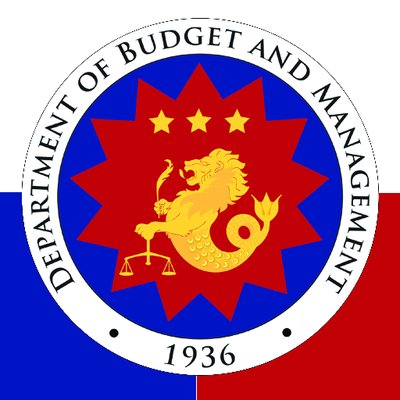
- Details
To the organizers of this event, GoodGovPH, led by Dexter Arvin Yang,
To our participants: civil society organizations, youth leaders, policy advocates, members of the press and academe,
And to all advocates and champions of good and open governance:
Good morning!
Assalamu alaikum wa Raḥmatullahi wa Barakatuh.
It is my honor to deliver the keynote message, although virtually, at this year’s Good Governance Conference. This event is a great opportunity to shine a light on how the youth can help shape our nation’s development through sustaining civic participation, calling for accountability, and fostering democratic engagement.
With that, allow me to express my sincerest appreciation to the GoodGovPH for creating this space to amplify the voices of young leaders and strengthen our shared commitment to good governance—within and beyond elections.
As you know, we are currently in a “super election year” due to a series of significant elections taking place nationwide. We held our national and local elections (NLE) in May, which will be followed by the Bangsamoro Autonomous Region in Muslim Mindanao (BARMM) Parliamentary elections in October. Through these, we reinforce our commitment to democratic governance and local development as cornerstones of our Agenda for Prosperity.
I am happy to note that during the May elections, we witnessed a groundbreaking improvement in voter turnout, reaching 82.2 percent—the highest midterm poll turnout in history! What’s even more inspiring is knowing that the youth played a significant role in this milestone.
According to the most recent data, Gen Z or registered voters aged 18 to 29 total almost 20 million— that’s nearly a third of the electorate! So, to those who braved the heat and long lines at their precincts last May, know that you did more than just cast your vote on a piece of paper—you made your voice heard and amplified the call for a more open, accountable, and participatory governance.
And so we, at the DBM and the Philippine Open Government Partnership (PH-OGP), will always believe in the power of the youth and continue to make youth participation in governance a more rewarding and meaningful endeavor.
First, we create and open spaces for dialogue. Through Executive Order No. 31, we have integrated the principles of open governance into our policies and systems. This institutionalizes not just our partnership, but also our responsibility to bring the government closer to the people, and making it open for their insights and contributions.
In 2023, we held the first-ever National OGP consultation with the youth, including children, to gather insights about the relevance of the 6th PH-OGP National Action Plan (NAP) commitments to their lives.
Since then, we continued involving student leaders and youth officers in our OGPinas! Nationwide Advocacy Campaign in all the 15 runs that we conducted across the country.
This year, we have provided a platform for the youth to engage in high-level discussions and contribute to the global conversations during the OGP Asia and the Pacific Regional Meeting in February. GoodGovPH even held a side-event on anti-corruption, joining us in our initiatives to strengthen transparency and accountability in our governance systems.
Just last month, during the celebration of Open Gov Week, we listened to the dreams of children, especially their vision for the kind of country they hope to see and the kind of future they wish to have. We also held the historic economic dialogue with civil society, wherein we reinforced our commitment to enhancing citizen engagement in the national budget process.
Most importantly, we empower our youth through targeted budget allocations for education.
Consistent with our Constitutional commitment, we allocated the largest share of our Fiscal Year 2025 National Budget to the Education sector, amounting to Php 1.055 trillion. This is in line with our mission to ensure that every Filipino has access to education, starting from early childhood all the way through higher education.
In line with this, we released Php 1 billion to support the establishment of Child Development Centers (CDCs) in 328 low-income LGUs across the country—benefiting 89 LGUs in Luzon, 106 in the Visayas, and 133 in Mindanao, including BARMM.
Some Php 27.25 billion is also allocated for the Universal Access to Quality Tertiary Education Program, which provides free tuition in all SUCs, education subsidies, and student loan programs.
Beyond these budget allocations, we are also implementing reforms that respond to the call of our citizens to strengthen the public’s trust in the government.
First of all, we have updated our decades-old procurement law to better align with the needs and realities of our people today. The New Government Procurement Act introduces mechanisms to promote transparency, curb corruption, and improve bureaucratic efficiency, making it the biggest anti-corruption measure in the country’s recent history.
Towards energizing the open governance space in the Philippines, I am proud to share that our OGP Localization efforts are showing promising results, with the OGP Local Members launching their local action plans and implementing their respective OGP initiatives in their communities.
On the national level, we are advancing the passage of the Right to Information (RTI) Law, as President Ferdinand R. Marcos Jr. emphasized that our citizens can only truly participate in governance if they have access to information. I am confident that we will soon have our own RTI Law, especially now that we have so many allies advocating for this cause, including GoodGovPH.
And we need more champions of good and open governance like you, whose votes, voices, and vision can help us continue making spaces for dialogues and implement reforms that foster a culture of trust and accountability.
Remember, nation-building is not reserved for those in power; it is our shared responsibility. Let us work together to shape a more open, accountable, and inclusive Bagong Pilipinas where every policy, program, and reform is responsive to the needs and aspirations of every Filipino.
Maraming salamat po! Mabuhay ang kabataang Pilipino!
Wabillahi Tawfiq Wal Hidaya, Wasalamu alaikum wa rahmatullahi wa Barakatuhu.
END
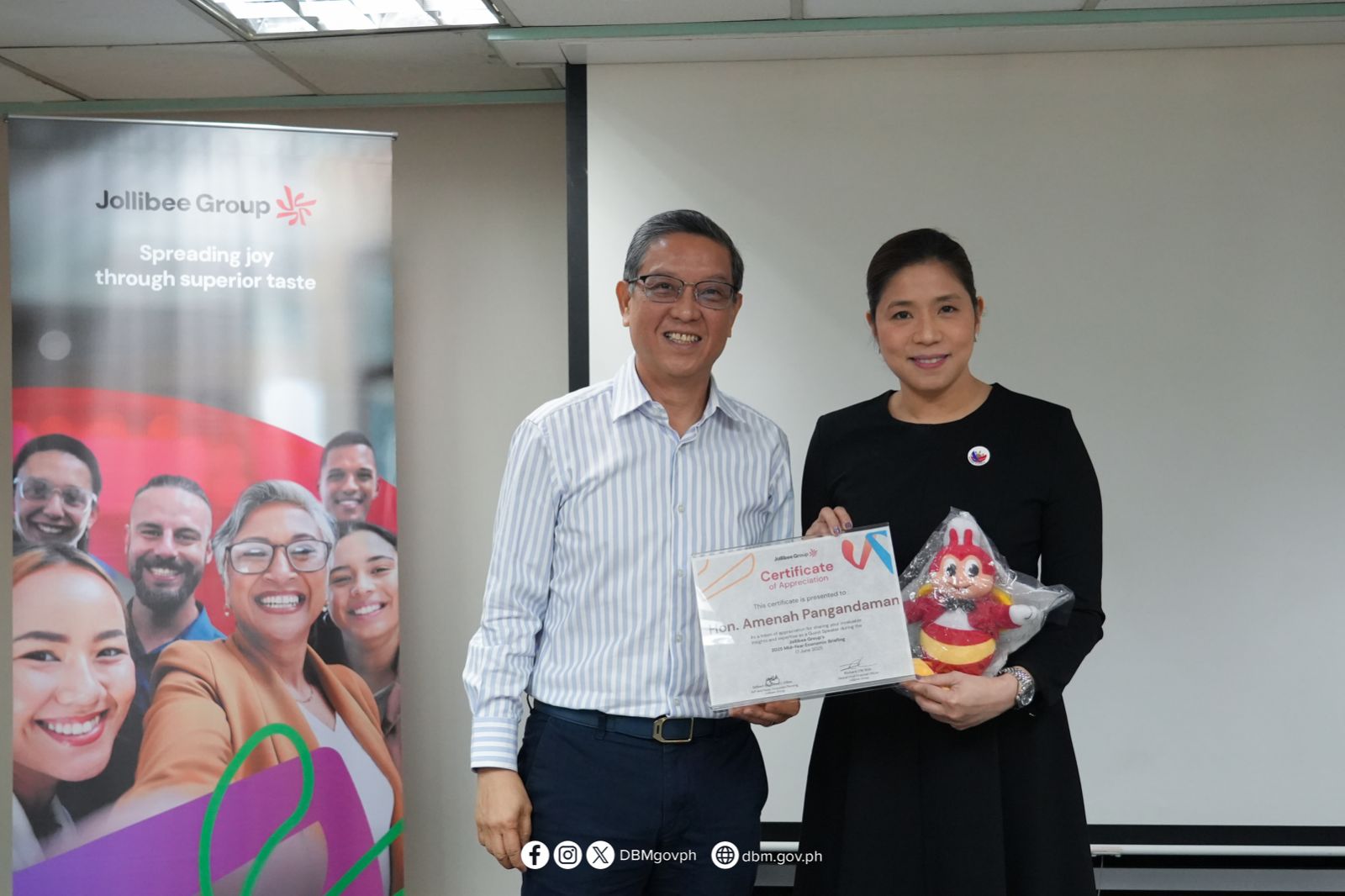
- Details

A Jolly Morning to everyone!
To our esteemed host, Jollibee Group, led by Executive Chairman and Founder Dr. Tony Tan Caktiong;
Distinguished leaders and members of the business community;
A pleasant day to everyone.
Assalamu alaikum wa Raḥmatullahi wa Barakatuh.
Introduction
It is a privilege to address a group that has become a true national icon and symbol of Filipino excellence and resilience.
It is no small feat and it brings our nation such pride and joy that what started out as a small family business is now a global leader boasting of not only four Gallup Exceptional Workplace Awards, but even making it to the list of TIME Magazine’s World’s Best Companies and Fortune’s Southeast Asia 500.
Indeed, you have shown that Filipino excellence can simultaneously grow a business and also win hearts across cultures, empower communities, and inspire generations of entrepreneurs. You have proven that we can bring joy—whether through Chickenjoy or other products and services—so that around the world, Bida ang Saya.
This Administration, however, would really like to see a world where truly, like Jollibee, bida ang Pinoy. Hence, in line with the Philippine Development Plan 2023-2028, the Economic Team has committed to creating an environment where businesses can flourish.
Today, allow me to share with you the trajectory of our national economy, our fiscal priorities, and how these align with our shared vision of inclusive and sustainable growth.
Sustaining the Country’s Strong Macroeconomic Fundamentals
At the onset, the Philippine economy is doing very well. We expanded, albeit moderately, by 5.4 percent in the first quarter of 2025, driven by strong domestic demand and accelerated government spending.
Notably, our 18.7 percent increase in public spending, the highest since November 2020, is a testament to the significant role of government in stimulating economic activity and in creating multiplier effects that benefit sectors such as retail, food services, and logistics.
Inflation has significantly decreased to a manageable rate of 1.3 percent in May of this year, which is not only well within our target range but also notably the lowest inflation rate recorded since November 2019.
Meanwhile, employment remains robust at 95.9 percent, translating to over 48 million Filipinos in the workforce.
With a median age of 25 years old, we have the youngest, most dynamic, and highly skilled workforce—not just in ASEAN but in the world. This shows that we have an existing talent pipeline ready to support the Jollibee Group in its expansion and innovation goals.
Medium-Term Fiscal Consolidation
On the fiscal side, we are staying true to our commitment to growth-enhancing fiscal consolidation.
In fact, our budget deficit for 2024 dropped to 5.7 percent of GDP—a marked improvement from the 6.2 percent recorded in 2023 and within the fiscal outlook of the Development Budget Coordination Committee (DBCC). Through disciplined spending and stronger revenue collection, we aim to create a macroeconomic environment that is investor-friendly.
Our fiscal prudence has not gone unnoticed. In November 2024, S&P Global upgraded our credit outlook from “stable” to “positive,” reaffirming global confidence in our macroeconomic and fiscal management. And this is just one among a series of high credit rating affirmations last year. This is good news because it means that we are viewed internationally as an economy that is performing well, and that the private sector can now gain access to more affordable financing for expansion.
We also achieved a major milestone in financial integrity, with the Philippines recently removed from the grey list of the Financial Action Task Force or FATF. This further solidifies our position as a credible and attractive investment destination.
FY 2025 National Budget
On the budget side, the Php 6.326 trillion FY 2025 National Budget, equivalent to 22 percent of GDP, is our key instrument for driving socioeconomic transformation. This budget reflects the strategic priorities of the Philippine Development Plan 2023–2028 and aims to fulfill the needs and aspirations of the Filipino people.
By Sector
The Social Services sector received the highest allocation, amounting to Php 2.030 trillion, or 32.1 percent of the National Budget, followed by the Economic Services sector, with Php 1.968 trillion, or 31.1 percent.
As mandated by the Philippine Constitution, education remains the government’s top priority, covering 16.7 percent of the national budget, well within the 15 to 20 percent threshold set by the UNESCO Education 2030 Framework.
On top of this, the budget of the Department of Health has consistently increased annually by 11.61 percent since the Administration took office in 2022.
We are also strengthening social protection with a budget of Php 217.50 billion for the Department of Social Welfare and Development to ensure no one is left behind in our pursuit of prosperity.
For business leaders, this means a more skilled workforce, healthier communities, and stronger domestic demand—all vital for sustainable economic development.
Further, we are determined to improve agricultural productivity and achieve food security with the Department of Agriculture and its attached agencies receiving a higher budget of Php 237.4 billion this year. We will also construct more farm-to-market roads with Php 23.2 billion to reduce logistics costs and improve access to regional markets.
MSME Development
We’re also scaling our support for Micro, Small, and Medium Enterprises or MSMEs, with a budget of Php 900 million allotted for the MSME Development Program and Php 655 million for the Industry Development Program in support of the Tatak Pinoy Act.
I’d like to take this moment to commend the Jollibee Group Foundation for your recent collaboration with the Department of Trade and Industry on the “Joy in Learning: MSMEs Meet and Learn” initiative to upskill our MSMEs. This is the kind of inclusive innovation that we need, showing that, truly, the private sector and the government can come together to empower entrepreneurs.
Infrastructure Development
Infrastructure development continues to be one of our top priorities, with the targeted 5.0 to 6.0 percent of GDP allocated annually for infrastructure spending.
In 2025, we allocated Php 1.645 trillion, or 5.7 percent of GDP, for the Build Better More Program. These investments support the construction of both physical and social infrastructure, from roads and bridges to schools, hospitals, irrigation systems, and health centers.
Public-Private Partnerships
Over the medium term, we are pursuing 207 flagship infrastructure projects focused on connectivity, energy, transport, and digital transformation.
To realize these projects, we are leveraging strategic co-investments with the private sector through Public-Private Partnerships (PPPs). With the passage of the new PPP Code, we have made private sector participation more agile and investor-friendly.
In 2024 alone, we have successfully awarded three (3) PPP airport projects, including the country’s main international airport—the Ninoy Aquino International Airport—and airports in Laguindingan and Bohol. We have also approved the privatization of two (2) airports in Dumaguete and Siargao.
And there is more to come. With at least 49 out of the 207 flagship projects primed for PPPs, we encourage the Jollibee Group to explore these opportunities and partner with us toward nation-building.
Digitalization Reforms
Let me also share how our budget reforms are fostering a more transparent, efficient, and sustainable business environment, starting with our digitalization efforts.
We are determined to fully digitalize and harmonize our Public Financial Management (PFM) systems and policies, through the adoption of the Integrated Financial Management Information System (IFMIS) across all government agencies. This will translate to faster government transactions and a significant reduction in red tape—factors that help improve ease of doing business.
Central to this effort is the PFM Reforms Roadmap 2024 to 2028, which we officially submitted to President Ferdinand R. Marcos Jr. last September and successfully launched with the support of the Asian Development Bank (ADB) the following month.
And we just presented the results of the 2024 Public Expenditure and Financial Accountability (PEFA) Assessments last week! This will help us identify remaining gaps in our PFM systems and drive further improvements toward greater transparency and more effective public service delivery.
Similarly, we launched the Budget and Treasury Management System, or BTMS, which connects existing separate systems into a central, real-time monitoring hub for government transactions. For the private sector, this means faster and more reliable government payments.
We also revived our Project DIME, or the Digital Information for Monitoring and Evaluation Project, a game-changing initiative that utilizes satellite and drone technology to help us verify development on the ground, particularly in remote areas. This prevents misallocation of funds and ensures that every peso contributes to real impact.
Climate Resilience Reforms
Also towards sustainability, the government has been exerting greater efforts to go green.
We recognize that the Jollibee Group has long championed environmental stewardship through your global sustainability agenda, Joy for Tomorrow, which upholds food safety, environmental responsibility, and energy-efficient operations.
On our end, we have more than doubled our climate change expenditures for this year to Php 1.156 trillion—the largest increase in recent history.
The DBM is also proud to be the first national government agency to appoint a Chief Sustainability Officer and create a Sustainability Committee. My goal for this initiative is to see to it that we are not only crafting green policies but also running a green institution. We hope to make this a model for other agencies to also establish their own Sustainability Committees to foster collective action toward a more sustainable future.
Program Convergence Budgeting
Toward a more efficient and effective government, we have also established a Program Convergence Budgeting (PCB) approach, which is an inter-agency effort to eliminate duplication of programs and ensure consistency in program targets, beneficiaries, resource requirements, and implementation timelines across agencies.
For the private sector, this means coherent and coordinated government programs—whether you’re engaging with us in local development or navigating through regulatory processes, you’ll benefit from a more unified whole-of-government approach.
Government Optimization Act
Not only that, we are proud to share that the Bicameral Conference Committee recently ratified the Government Optimization Act, which aims to build a streamlined bureaucracy that minimizes redundancies, reduces unnecessary delays, and simplifies government processes, all of which make it easier to do business.
Procurement Reforms
Also towards efficiency but even more so towards fighting corruption, one of the reforms I am most proud of is the New Government Procurement Act (NGPA), initiated by the DBM with our Procurement Service and the Government Procurement Policy Board, which I chair. This is hailed as the biggest anti-corruption measure in the country’s recent history as the law introduces mechanisms to promote transparency, curb corruption, and improve efficiency in government procurement processes.
For instance, we have introduced open contracting, making procurement data and documents publicly available from planning to bidding to contract implementation. This boosts investor confidence, lowers risk, and supports corporate governance standards that the Jollibee Group already upholds.
We have also established an electronic Marketplace or eMarketplace—a government version of Lazada and Shoppee, where agencies can “add to cart” and directly procure from competent and reputable suppliers. This reform opens doors for private suppliers, especially Filipino firms, to participate fairly and easily in government contracts.
Open Governance Reforms
Speaking of transparency, recognizing that having an open and transparent government is essential in building a thriving business climate, we have placed transparency and accountability at the forefront of our Agenda for Prosperity.
I am therefore proud to share that in the latest Open Budget Survey that ranked countries around the world, the Philippines was ranked by the International Budget Partnership as the most fiscally transparent country—No. 1 in budget transparency not just in Southeast Asia but in all of Asia, and hopefully in the world, as we make it a point to have our budget documents open for public review and scrutiny.
We’ve also seen significant progress in press freedom. In 2025, the Philippines climbed to its highest-ever ranking in the World Press Freedom Index, reaching the 116th spot—an 18-point jump from 2024.
However, we hope to increase this ranking even more. That’s why, as Chair of the Philippine Open Government Partnership (PH-OGP), I have been actively pushing for the passage of a robust Right to Information that will enshrine every Filipino’s constitutional right to access information. For businesses, this means easier access to reliable data and government policies, enabling you to make more informed decisions and better anticipate market and regulatory changes.
This administration takes its role as a founding member of the Open Government Partnership—a global initiative fostering transparency and accountability of governments—seriously. PBBM issued Executive Order No. 31 institutionalizing PH-OGP in order for all government agencies to inculcate open government values. Last October, I joined the global Steering Committee, marking the re-entry of the Philippines as a global leader in the Open Government community.
And last February, the Philippines also hosted, for the first time, the OGP Asia and the Pacific Regional Meeting. It brought together over a thousand open government champions and reformers, including private sector representatives, from more than 40 countries to share best practices, exchange ideas, and commit to advancing an open government. I’m inviting the Jollibee Group to be part of the Open Government Partnership.
Following this, we also conducted the first-ever economic dialogue with civil society during the OpenGov Week—another DBM initiative—where we had a roundtable discussion with non-government organizations, including private sector representatives from the Makati Business Club and the Financial Executives Institute of the Philippines (FINEX) on the government’s macroeconomic and fiscal priorities. As a government official and as a citizen, I truly believe in the importance of listening to civil society and in opening our minds to diverse perspectives to ensure that our policies are inclusive, transparent, and responsive to the needs and aspirations of the Filipino people.
So as you can see, amidst all the politics in the news today, I assure you, on our end, we are working very hard to create an environment where financial institutions and businesses can operate with certainty. We have been successful in pushing for more mechanisms to foster the values of transparency and accountability, and we will continue to do so for greater investor confidence that will ultimately result in our economic transformation.
Closing
As we seek to sustain the Philippines’ strong growth trajectory, following our impressive post-pandemic recovery, we hope that we can somehow collaborate further so that together, we can bring joy to even more Filipinos—sa Bagong Pilipinas, gawin nating Bida ang Pinoy.
And let’s spread joy around the world for superior taste!
Thank you very much.
Wabillahi Tawfiq Wal Hidaya, Wasalamu alaikum wa rahmatullahi wa Barakatuhuh.
